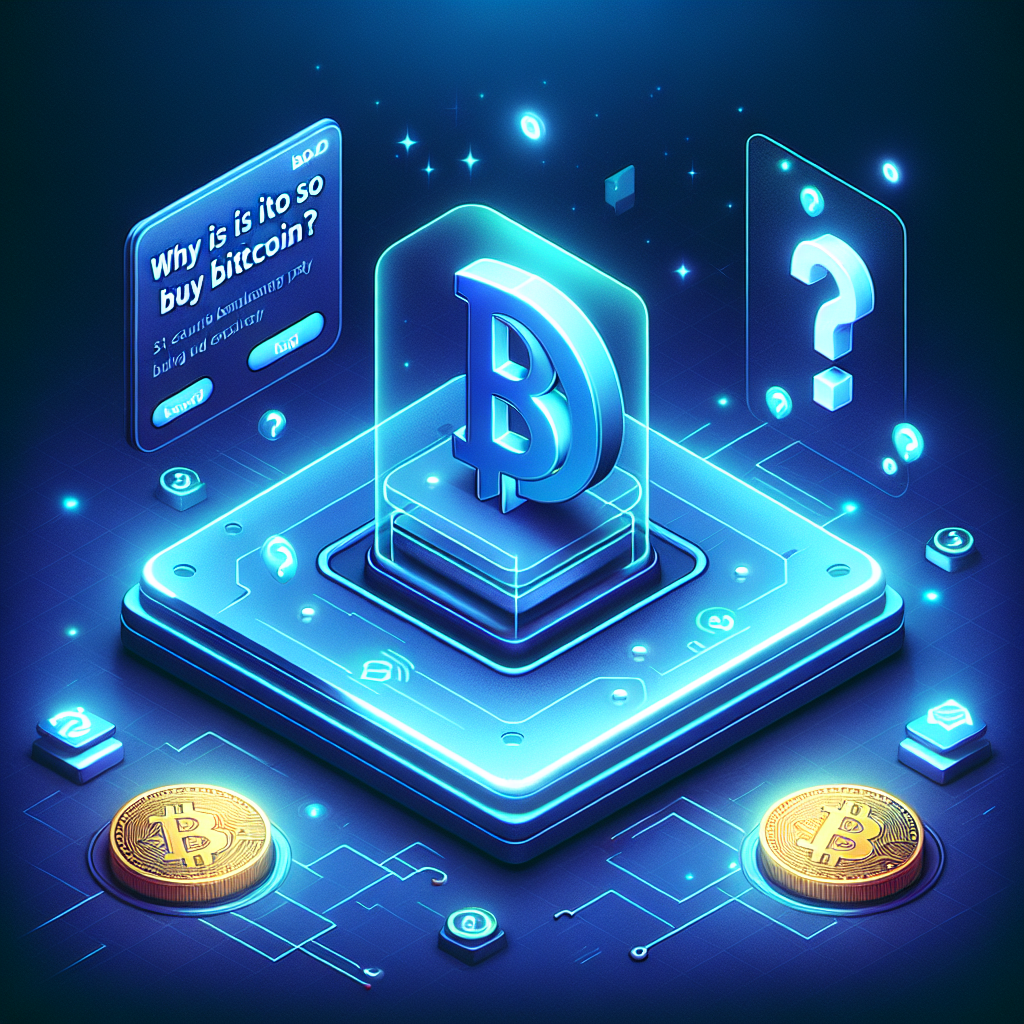Introduction
Have you ever tried to buy Bitcoin and found yourself more confused than excited? You’re not alone. Many people encounter a myriad of challenges when attempting to make their first purchase of this popular cryptocurrency. With Bitcoin steadily gaining momentum as an investment and a legitimate currency, it matters more than ever to understand why buying it can be so difficult. In this post, we’ll dive into the intricacies of purchasing Bitcoin, breaking down common roadblocks and empowering you with the knowledge you need to overcome them. So if you’ve been wondering why is it so hard to buy bitcoins, keep reading!
Problem / Context
The growing popularity of Bitcoin has created a greater demand for it, but this surge comes with its own set of challenges. Many potential buyers face barriers such as understanding how cryptocurrency exchanges work, security concerns, varying regulations, and a lack of trustworthy information. These hurdles may make the buying process feel overwhelming and complicated, deterring many from pursuing their interest in Bitcoin.
The Complexity of Cryptocurrency Exchanges
The most common way to buy Bitcoin is through cryptocurrency exchanges, but navigating these platforms can be a daunting task. Unlike traditional financial systems, cryptocurrency exchanges operate differently in several key ways:
Varied Platforms: There are hundreds of exchanges, each with unique features, fees, and user interfaces. Some are user-friendly, while others cater to more experienced traders, complicating the onboarding process for newcomers.
Know Your Customer (KYC) Requirements: Many exchanges require extensive identity verification to comply with regulations. This can involve submitting personal documents and can feel invasive, especially for first-time buyers.
Fees and Commissions: Each exchange has its fee structure, which can vary widely. Understanding these fees is essential to avoid unexpected costs that could impact your investment.
Market Volatility: Bitcoin prices are notoriously volatile. If you’re not prepared for rapid price changes, you could face significant losses or missed opportunities.
Main Content
Understanding Cryptocurrency Exchanges
Types of Exchanges
Centralized Exchanges (CEX): These platforms act as intermediaries between buyers and sellers. While they are generally easier to use, they come with risks such as hacking and regulatory scrutiny.
Decentralized Exchanges (DEX): DEXs allow users to trade directly with one another without intermediaries. Though they offer enhanced privacy, they can be more challenging for beginners to navigate.
Tips for Choosing an Exchange
Research Reputation: Look for platforms with a strong history of security and user satisfaction. Websites like CoinMarketCap and CoinGecko provide user reviews and statistics.
Evaluate Supported Payment Methods: Select an exchange that accepts a payment method you’re comfortable with, whether it’s a bank transfer, credit card, or even cash.
Check for Insurance Policies: Some exchanges offer insurance on certain assets stored in their wallets. This can provide extra peace of mind.
Security Concerns
Protecting Your Investment
As with any financial investment, the security of your purchase is paramount. Here are a few steps to bolster your defense:
Use Hardware Wallets: Once you purchase Bitcoin, consider transferring it to a hardware wallet for enhanced security, as exchanges can be vulnerable to breaches.
Two-Factor Authentication (2FA): Enable this feature on any exchange and wallet you use to add an additional layer of security.
Watch for Phishing Scams: Be cautious of unsolicited emails or messages claiming to be from legitimate exchanges. Always verify directly through their official channels.
Regulatory Issues
Local Regulations
The legal landscape for Bitcoin is constantly evolving, and local regulations can significantly impact your buying experience. Different countries have varied stances on cryptocurrency, affecting taxation and business operations:
Legal Status: Some countries embrace cryptocurrencies, while others impose strict regulations or outright bans. Always check the local laws before attempting to buy Bitcoin.
Tax Implications: In many jurisdictions, buying Bitcoin may have tax implications. Familiarize yourself with applicable laws to avoid unpleasant surprises down the line.
Recommendations for Compliance
Stay Informed: Regularly check authoritative resources like CoinDesk or CoinTelegraph for updates regarding regulations affecting Bitcoin purchases.
Seek Professional Advice: Consider consulting a financial advisor for guidance that takes your specific situation and locale into consideration.
Knowledge Gaps and Misinformation
The Importance of Trustworthy Sources
Many potential Bitcoin buyers are plagued by the misinformation that proliferates online. Misleading advice can lead to costly mistakes. To sidestep confusion, prioritize reliable educational resources:
Online Courses: Platforms offer courses that demystify Bitcoin and cryptocurrency trading. Look for reputable sources like Coursera or Udemy.
Social Media and Forums: While platforms like Reddit and Twitter can be informative, always cross-reference information with trusted sources.
Common FAQs
Q: What’s the minimum amount I can invest in Bitcoin?
A: Most exchanges allow for fractional purchases, meaning you can invest as little as $10 or even less, depending on the platform.
Q: Is buying Bitcoin anonymous?
A: While Bitcoin transactions are recorded on a public ledger, your identity can be tied to your exchange account, especially if KYC regulations are in place.
Q: Can I buy Bitcoin with cash?
A: Yes, some exchanges allow cash purchases at Bitcoin ATMs, while others may offer local peer-to-peer exchanges where cash is accepted.
Creating a Roadmap for Your Purchase
Step-By-Step Guide
Research and Choose an Exchange: Select a CEX or DEX that fits your experience level and payment preferences.
Complete KYC Verification: Prepare the necessary documents to facilitate a smooth account setup.
Secure Your Account: Activate 2FA and any other security protocols.
Purchase Bitcoin: Once all set up, you can buy Bitcoin directly via your chosen exchange or via a peer-to-peer platform.
Store Bitcoin Safely: Transfer your new asset to a secure wallet for long-term storage.
Conclusion
Buying Bitcoin may seem complicated at first, but with the right knowledge and preparation, the process can become far less intimidating. Understanding the nuances of cryptocurrency exchanges, security measures, regulations, and reliable resources can empower you to navigate the landscape confidently.
If you’re ready to take the leap, remember the key takeaways: choose a trustworthy exchange, prioritize security, stay informed about regulations, and never hesitate to seek professional advice. The world of Bitcoin is expansive and potentially rewarding—don’t let complexity hold you back from exploring it!
To dive deeper into investing strategies, check out our guide on cryptocurrency market trends or learn about keeping your digital assets secure.
Happy investing!



